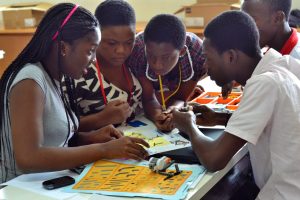It’s no secret that our planet is under huge pressure and that Environment and Sustainability are important subjects to be discussed when it comes to ensuring our future life on earth.
In 2015, the Heads of State and Government met at United Nations Headquarters to discuss these topics and determine the agenda of how to transform our world by 2030.
During these three days the United Nations (UN) came up with 17 new global Sustainable Development Goals (SDG) which balance the three dimensions of sustainable development: the economic, social and environmental.
These goals reflect the UN’s supremely ambitious and transformational vision to envisage a world free of poverty, hunger, disease and where all life can thrive. Well that sounds great, doesn’t it? But perhaps also a bit overwhelming, because what can one individual person do, to change anything, regarding these global sustainable goals? A lot actually – and here are just a few suggestions to get started!
5 Basics!
You’ve heard it all before. It is becoming basic knowledge in our everyday lives but here we go again:
1) Save electricity by turning off appliances when not in use – and use energy friendly light bulbs
2) Turn off the light and take advantage of the natural light instead
3) Think before you print! – And recycle the paper you do use for printing.
4) Actually just recycle: Paper, plastic, glass, aluminium…
5) Take short(er) showers and save water
5 Bigger!
UN’s Sustainable Goals are huge and ambitious – but even the smallest individual initiatives count in the effort to save our planet. So be inspired by 5 (of the 169) targets related to the SDGs and make a difference!

Goal 3: Good health and wellbeing, target 3.5: halve the number of global deaths and injuries from road traffic accidents
• Don’t drink and drive
• Don’t text, tweet or snapchat and drive
• Lower the speed, just a bit
• Drive considerately
 Goal 12: Responsible consumption and production, target 12.3: halve per capita global food waste at the retail and consumer levels and reduce food losses along production and supply chains, including post-harvest losses:
Goal 12: Responsible consumption and production, target 12.3: halve per capita global food waste at the retail and consumer levels and reduce food losses along production and supply chains, including post-harvest losses:
• Don’t “overbuy” – plan meals and use shopping lists
• Freeze fresh products and leftovers if you don’t have the chance to eat them before they go bad – also your take-away food.
• Eat less meat, poultry and fish. Producing meat takes a lot more resources than producing plants.
• Buy and eat seasonal produce from local growers!
 Goal 10: Reduced inequalities, target 10.2: empower and promote the social, economic and political inclusion of all, irrespective of age, sex, disability, race, ethnicity, origin, religion or economic or other status:
Goal 10: Reduced inequalities, target 10.2: empower and promote the social, economic and political inclusion of all, irrespective of age, sex, disability, race, ethnicity, origin, religion or economic or other status:
• Don’t be judgemental to differences but be open-minded
• Embrace differences and learn from people different than you
• Be helpful, be a friend and take your time to listen to peoples’ different opinions and situations
Goal 12: Responsible consumption and production, target 12.5: substantially reduce waste generation through prevention, reduction, recycling and reuse • Recycle!
• Recycle!
• Donate what you don’t use – clothes, books, furniture, food! By donating you also contribute to other goals aiming towards no poverty, zero hunger and reduced inequalities.
• Shop second-hand – or trade clothes with colleagues, friends or family.
• Use refillable water bottles and coffee cups
• Use reusable cloth bags rather than plastic
 Goal 8: Decent work and economic growth, target 8.6: substantially reduce the proportion of youth not in employment, education or training.
Goal 8: Decent work and economic growth, target 8.6: substantially reduce the proportion of youth not in employment, education or training.
• Encourage youth to work and get an education
• Provide jobs, trainee spots and internships
• Inspire youth by showing the value of having a job, earning your own money and being able to provide yourself and your family
• Show value in contributing to society
Retrieved from: www.oundationfootprint.com/news/10-ways-an-individual-can-contribute-to-the-un-sustainable-development-goals/


